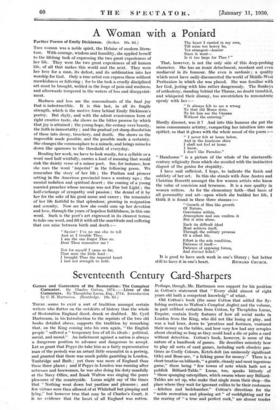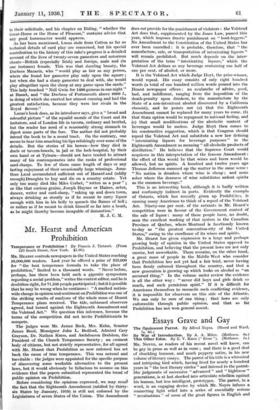Seventeenth Century Card-Sharpers Games and Gamesters of the Restoration :
The Compleat Gamester. By Charles Cotton, 1674.—Lives of the Gamesters. By Theophilus Lucas, Esq., 1714. Introduction by C. H. Hartmann. (Routledge. 10s. 6d.) THERE seems to exist a sort of tradition amongst certain writers who flutter on the outskirts of history that the whole of Restoration England diced, drank or drabbed. Mr. Cyril
Hartmann, in his Introduction to the reprints of the two old books detailed above, supports the tradition by remarking that, on the King coming into his own again, " the English people " suffered a " temporary loss of all its ideals : political, social, and moral." An indictment against a nation is always a dangerous position to advance and dangerous to accept.
Let us grant that Pepys (to take him as a fairly representative man of the period) was an arrant little sensualist in a periwig, and granted that there was much public gambling in London, Tunbridge and Bath ; yet there was more of England than these three places ; and if Pepys in London was running after actresses and lacewomen, he was also doing his duty manfully at the Navy Office, and Izaak Walton was singing the purer pleasures of the countryside. Lucas might say of the times that " Nothing went down but pastime and pleasure ; and few virtues were then allowed of at Whitehall but pimping and lying," but however true that may be of Charles's Court, it is no evidence that the heart of all England was rotten. Perhaps, though, Mr. Hartmann sees support for his position in Cotton's statement that " Every child almost of eight years old hath a competent knowledg" of whist.
Old Cotton's book (the same Cotton that added the fly- fishing sections to Walton's Compleat Angler) and the volume, in part cribbed verbatim from Cotton, by Theophilus Lucas, Esquire, contain lively features of hoW all social ranks in London from the King, who did not like losing at play, and was a bad loser, down to 'prentices and footmen, ventured their money on the tables, and how very few had any scruples about cheating so long as they could load a die or palm a card without detection. Cotton's book, however, is more of the nature of a handbook of games. He describes minutely how to play all sorts of card games, including such obsolete pas-, times as Costly Colours, Ketch-dolt (an ominously significant title) and Bone-ace, " a licking game for money." There is a short treatise on billiards, " a gentle, cleanly and most ingenious game," there being " few towns of note which bath not a publick Billiard-Table." Lucas, too, speaks bitterly of " those spunging caterpillars, which swarm where any Billiard- Tables are set up, who make that single room their shop—the place where they wait for ignorant cullies to be their customers —kitchen and bedchamber." Cotton's directions for the " noble recreation and pleasing art " of cockfighting and for the rearing of " a true and- perfect cock," are almost- tender
In their solicitude, and his chapter on Riding, " whether the Great-Horse or the Horse of Pleasure," contains advice that any good horsemaster would approve. • - As has been mentioned, Lucas stole from Cotton as far as technical details of card play are concerned, but his special contribution to the history of this rake's progress is a detailed account of the lives of twenty-seven gamesters and notorious cheats—British (especially Irish) and foreign, male and (in one instance) female. This was that dazzling beauty, the Duchess Mazarin, who " would play as fair as any person, where she found her gamester play only upon the square ; but when she had a sharp gamester to deal with, she would play altogether upon the sharp at any game upon the cards." This lady touched " Nell Gwin for 1400 guineas in one night " at Basset, and " the Duchess of Portsmouth above 8000 1., in doing of which she exerted her utmost cunning and had the greatest satisfaction, because they were her rivals in the Royal favour."
Lucas's book does, as its introducer says, give a " broad and colourful picture " of the squalid morals of the Court and its imitators, and of London life in tavern, ordinary and brothel, but the reader has need of a reasonably strung stomach to digest some parts of the fare. The author did not probably intend the book to be a moral tract. On the contrary, one seems to hear him smacking his lips relishingly over some of the details. But the stories of his heroes—how they died in duels or tavern-brawls, in jail or the lock-hospital, by their own hand or at Tyburn—should not have tended to attract many of his contemporaries into the ranks of professional card-sharps. To few of them came length of days or any lasting enjoyment of their occasionally large winnings. Jona- than Laud accumulated sufficient out of Hazard and (oddly enough) Draughts to buy and die on a country estate. Yet only too many died like Miles Corbet, " rotten as a pear " ; or like that curious genius, Joseph Haynes or Haines, actor, dancer, writer and card-sharp, " raking up and down town, always drinking as stoutly as if .he meant to carry liquor enough with him in- his belly to quench the flames of hell ; or rather as if he meant to drink himself so far into a beast, as he might thereby become incapable of damnation."
M. J. C. M.







































 Previous page
Previous page